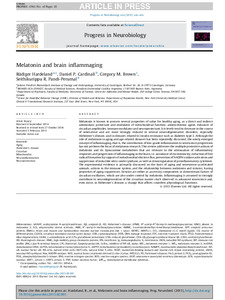Por favor, use este identificador para citar o enlazar este ítem:
https://repositorio.uca.edu.ar/handle/123456789/1442| Título: | Melatonin and brain inflammaging | Autor: | Hardeland, Rüdiger Cardinali, Daniel Pedro Brown, Gregory M. Pandi Perumal, Seithikurippu R. |
Palabras clave: | MEDICINA; MELATONINA; CEREBRO; INFLAMACION; MITOCONDRIA; ENFERMEDAD DE ALZHEIMER; ENVEJECIMIENTO | Fecha de publicación: | 2015 | Editorial: | Elsevier | Cita: | Hardeland, R., et al. Melatonin and brain inflammaging [en línea]. Postprint del documento publicado en Progress in Neurobiology. 2015, 127-128. doi:10.1016/j.pneurobio.2015.02.001. Disponible en: https://repositorio.uca.edu.ar/handle/123456789/1442 | Resumen: | Abstract: Melatonin is known to possess several properties of value for healthy aging, as a direct and indirect antioxidant, protectant and modulator of mitochondrial function, antiexcitotoxic agent, enhancer of circadian amplitudes, immune modulator and neuroprotectant. It is levels tend to decrease in the course of senescence and are more strongly reduced in several neurodegenerative disorders, especially Alzheimer’s disease, and in diseases related to insulin resistance such as diabetes type 2. Although the role of melatonin in aging and age-related diseases has been repeatedly discussed, the newly emerged concept of inflammaging, that is, the contribution of low-grade inflammation to senescence progression has not yet been the focus of melatonin research. This review addresses the multiple protective actions of melatonin and its kynuramine metabolites that are relevant to the attenuation of inflammatory responses and progression of inflammaging in the brain, i.e. avoidance of excitotoxicity, reduction of free radical formation by support of mitochondrial electron flux, prevention of NADPH oxidase activation and suppression of inducible nitric oxide synthase, as well as downregulation of proinflammatory cytokines. The experimental evidence is primarily discussed on the basis of aging and senescence-accelerated animals, actions in the immune system, and the relationship between melatonin and sirtuins, having properties of aging suppressors. Sirtuins act either as accessory components or downstream factors of circadian oscillators, which are also under control by melatonin. Inflammaging is assumed to strongly contribute to neurodegeneration of the circadian master clock observed in advanced senescence and, even more, in Alzheimer’s disease, a change that affects countless physiological functions. | URI: | https://repositorio.uca.edu.ar/handle/123456789/1442 | ISSN: | 0301-0082 | Disciplina: | MEDICINA | DOI: | 10.1016/j.pneurobio.2015.02.001 | Derechos: | Acceso abierto. 1 año de embargo | Fuente: | Postprint del documento publicado en Progress in Neurobiology Vol. 127-128, 2015 ISSN 0301-0082 |
| Aparece en las colecciones: | Artículos |
Ficheros en este ítem:
| Fichero | Descripción | Tamaño | Formato | |
|---|---|---|---|---|
| melatonin-brain-inflammaging-cardinali.pdf | 904,89 kB | Adobe PDF |  Visualizar/Abrir |
Visualizaciones de página(s)
166
comprobado en 30-abr-2024
Descarga(s)
1.335
comprobado en 30-abr-2024
Google ScholarTM
Ver en Google Scholar
Altmetric
Altmetric
Este ítem está sujeto a una Licencia Creative Commons

